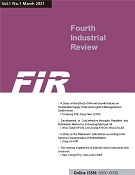 E-ISSN : 2765-7213
E-ISSN : 2765-7213
Vol.4 No.1
Abstract
Purpose: Education is the part of a fundamental human right across the world. In recent years, the trend of virtual education has increased tremendously. The paper aims to find the impact of adoption, accessibility, interactions, knowledge, and satisfaction on the success of transformation towards virtual education. Research design, data and methodology: Primary data has been gathered through the use of responses from students taking admission in virtual higher education to standardized questionnaires. Of the 250, only 122 were considered complete and have been used in further studies. Convinced random sampling method has been used. The results were evaluated using the Likert Five-Point Scale. For applying these statistical tools software SmartPLS and SPSS 19 have been used. The fitness of the model has been re-checked through an Artificial Neural Network (ANN). Result: Results derived that adoption, accessibility, and interactions have a significant impact on knowledge, knowledge influences satisfaction level and satisfaction have a meaningful impact on the success of transformation towards virtual education. Conclusion: It can be concluded that virtual education has the potential to change the future of the education system and its potential in India. The highest importance is due to satisfaction (100%), adoption (98.7%), knowledge (91.4%), accessibility (62%), and interaction (29.2%).
Abstract
Purpose: The purpose of this study is to develop a geography class teaching and learning guide that enables learners to realistically explore the characteristics of the world's climate and geographical environment using digital tools. Research design, data and methodology: We review previous research on classes using goal-based scenario learning models, gamification, and digital tools, and explore tools that can be applied to world geography classes. Based on the exploration results, a goal-based scenario learning module is designed and a strategy for promoting educational gamification is established based on the ADDIE instructional design model. Results: The study comprises four sessions. Sessions 1-3 involve performance evaluations using a goal-based scenario learning module. Learners create game characters reflecting geographical characteristics, present results, and proceed with 3D modeling. In Session 4, a gamification class using Google Sites on the CoSpaces metaverse platform will be conducted. Conclusions: The study introduces a goal-based scenario learning model and a gamification class using digital tools to empower learners in exploring geographical diversity and its impact on lifestyles. Utilizing an accessible online platform, the study provides practical measures for integrating digital tools into geography education, addressing the current importance of digital technology in teaching.
Abstract
Purpose: This study is based on the results of the National Information Society Agency's the Report on the Digital Divide in 2022. This study sought to develop digital literacy education programs for senior citizens, a digitally disadvantaged group, and to utilize smart devices to enhance their digital capabilities. Research design, data and methodology: Based on Gagné’s nine events of instruction, a total of 7-session educational programs using smart devices were developed, and teaching-learning goals were set at a level that older learners can realistically perform. In preparation for the era of digital transformation, AI utilization methods are introduced and utilized in some sessions of the educational program. Results: Among a total of 7 sessions of the educational program, 5 sessions using KakaoTalk and Naver App, and 2 sessions using other apps were developed. There are a total of three sessions using AI. Conclusions: This study presented a digital literacy education program that combined AI, addressing the insufficiency of AI-based education programs targeting senior citizens. It is expected that this educational program will be able to improve the digital literacy skills and provide a basis for fulfilling their responsibilities as digital citizens by suggesting a direction for AI utilization education for senior citizens.
Abstract
Purpose: This study is a prior study for expanding the science museum’s online services. Based on case studies, we propose an online service for science museums in the future. Research design, data, and methodology: This study analyzed online-based science museums services trends. The data was collected based on the cases of five national science museums. To understand the characteristics of science museum’s online services, we analyzed the status of digital content provided by each science museum and the operation method of online special exhibitions. Result: The national science museums provided online services through virtual science museums, SNS, and YouTube. However, the services still imposed limitation on facilitating active learning for visitors. In the case of SNS and YouTube, it is only a one-time promotional tool. Conclusion: This study suggests the need for concrete measures to utilize the abundant content accumulated so far in actual education. Additionally, it emphasizes the importance of content development incorporating new platforms.













